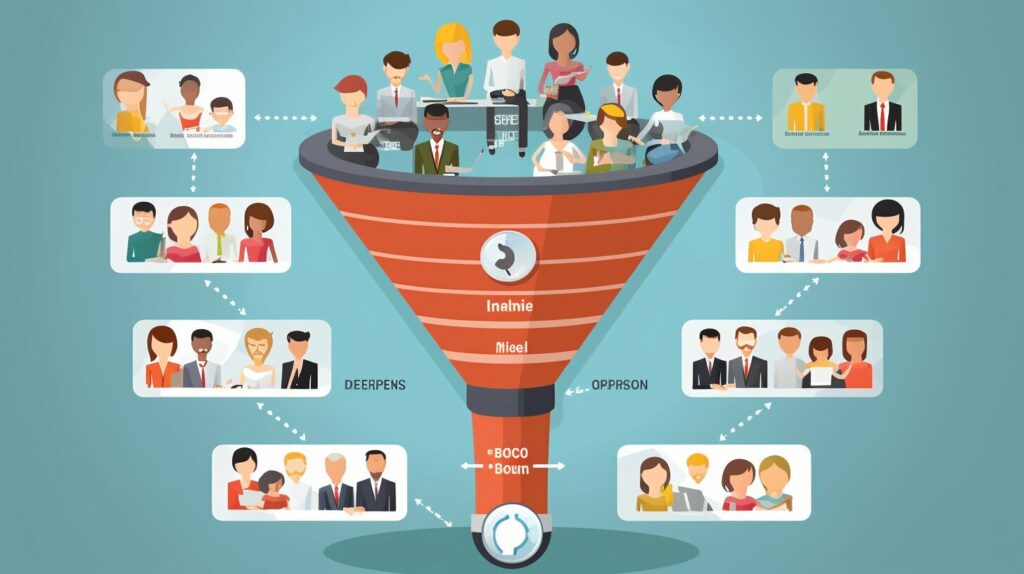B2B lead generation is crucial for businesses looking to maximize growth and expand their customer base. It involves attracting potential customers and converting them into qualified leads through various strategies and techniques. By implementing effective lead generation strategies, businesses can increase sales, improve brand awareness, target their audience better, and develop stronger customer relationships.
Key Takeaways:
- B2B lead generation is the process of attracting potential customers and converting them into leads.
- There are two types of B2B leads: Marketing-Qualified Leads (MQL) and Sales-Qualified Leads (SQL).
- Effective B2B lead generation strategies include content marketing, email marketing, webinars and events, paid advertising, and referral marketing.
- The B2B lead generation process includes lead acquisition, lead nurturing, and prospecting high-quality leads.
- B2B lead generation is important for both sales and marketing teams, as it helps identify ideal customers and increases conversion rates and revenues.
Understanding B2B Lead Generation
B2B lead generation is the process of attracting potential customers to your business and converting them into valuable leads. It plays a crucial role in driving business growth by identifying and engaging with the right audience. To effectively implement lead generation strategies, it is essential to understand the techniques and tools involved in the process.
There are two types of B2B leads: Marketing-Qualified Leads (MQL) and Sales-Qualified Leads (SQL). MQLs are prospects who have shown interest in your company’s products or services, while SQLs are prospects that have been further qualified and are more likely to make a purchase. By categorizing leads based on their readiness to buy and qualification, businesses can prioritize their efforts and improve the sales cycle.
The B2B lead generation process involves a series of steps, including lead acquisition, lead nurturing, and prospecting high-quality leads. Various strategies can be employed to attract potential customers, such as content marketing, email marketing, webinars and events, paid advertising, and referral marketing. Implementing a strong B2B lead generation strategy can have significant benefits, including increased sales, improved brand awareness, better audience targeting, and enhanced customer relationships.
The Types of B2B Leads
Before diving into the various lead generation techniques and tools, it’s important to understand the different types of B2B leads. Marketing-Qualified Leads (MQLs) are those prospects who have shown interest in your company’s offerings but may require further nurturing before becoming Sales-Qualified Leads (SQLs). On the other hand, SQLs have shown a higher level of interest and are more likely to make a purchase.
By distinguishing between MQLs and SQLs, businesses can tailor their lead generation strategies to effectively engage with each group. This segmentation allows for more targeted and personalized communication, resulting in higher conversion rates and improved ROI.

To better understand how B2B lead generation techniques and tools work, refer to the table below for a comprehensive overview:
| Lead Generation Technique | Description |
|---|---|
| Content Marketing | Creating and distributing valuable content to attract and engage potential buyers. |
| Email Marketing | Sending targeted emails to nurture leads and drive them towards conversion. |
| Webinars and Events | Hosting webinars and events to educate, engage, and generate leads. |
| Paid Advertising | Running paid campaigns on platforms like Google Ads or social media to drive traffic and capture leads. |
| Referral Marketing | Encouraging existing customers to refer potential leads through incentives, rewards, or discounts. |
Each technique has its own advantages and may be more suitable for certain businesses or target audiences. By leveraging these techniques effectively, businesses can increase their lead generation efforts and ultimately achieve their growth objectives.
The Types of B2B Leads
B2B leads can be categorized into two types: Marketing-Qualified Leads (MQL) and Sales-Qualified Leads (SQL). MQLs are potential customers who have shown interest in a company’s products or services through various marketing efforts. They may have engaged with content, subscribed to a newsletter, or requested more information. These leads have demonstrated some level of interest, but they have not yet been qualified as ready to make a purchase.
On the other hand, SQLs are leads that have been further qualified and are deemed ready for the sales team to engage with. These leads have shown a higher level of intent and are closer to making a purchase decision. They may have attended a webinar, requested a demo, or engaged with sales-oriented content. The sales team will follow up with these leads to provide more information, address specific needs, and ultimately close the sale.
Understanding the distinction between MQLs and SQLs is crucial for effective lead generation and sales efforts. By identifying and catering to the needs of MQLs, businesses can nurture these leads over time and move them through the marketing funnel. Once they reach the SQL stage, the sales team can focus on providing personalized assistance, guiding the lead towards making a purchase.

As businesses implement their lead generation strategies, they must consider the different types of B2B leads and tailor their approach accordingly. By targeting MQLs with valuable content and engaging them through various channels, companies can build brand awareness, establish trust, and nurture relationships. Similarly, focusing on SQLs allows the sales team to prioritize leads with the highest likelihood of conversion and provide them with the necessary support to facilitate a sale.
The Difference Between MQLs and SQLs
| Marketing-Qualified Leads (MQL) | Sales-Qualified Leads (SQL) |
|---|---|
| Expressed interest in the company’s products or services | Higher intent and readiness to make a purchase |
| Engaged with marketing content | Engaged with sales-oriented content |
| Not yet qualified as ready for sales engagement | Qualified and ready for sales engagement |
By effectively categorizing and nurturing both MQLs and SQLs, businesses can maximize their lead generation efforts and increase the likelihood of converting leads into loyal customers. It is essential to have a well-defined process in place to identify, track, and qualify leads throughout the B2B lead generation journey.
Implementing Effective B2B Lead Generation Strategies
Implementing effective strategies is crucial for B2B lead generation success, and some popular strategies include content marketing, email marketing, webinars and events, paid advertising, and referral marketing. Content marketing involves creating valuable and informative content to attract and engage potential customers. By providing relevant information and insights, businesses can establish themselves as industry leaders and build trust with their target audience.
Email marketing is another powerful tool in the B2B lead generation arsenal. Sending personalized and targeted emails to potential customers can help nurture relationships, drive engagement, and convert leads into sales. Webinars and events provide a platform to showcase expertise, interact with potential customers, and generate quality leads. By organizing webinars or attending industry events, businesses can connect with their target audience and create opportunities for lead generation.
Paid advertising is an effective way to increase brand visibility and reach a wider audience. Utilizing platforms such as Google Ads or social media advertising can help businesses target specific demographics and generate high-quality leads. Referral marketing, on the other hand, relies on word-of-mouth and recommendations from satisfied customers. By incentivizing referrals and providing excellent customer experiences, businesses can tap into their existing network and acquire new leads.
Implementing these strategies requires careful planning, execution, and ongoing optimization. By understanding your target audience, utilizing the right marketing channels, and creating compelling content, businesses can drive B2B lead generation success and cultivate meaningful customer relationships.
| Strategy | Description |
|---|---|
| Content Marketing | Create valuable and informative content to attract and engage potential customers. |
| Email Marketing | Send personalized and targeted emails to nurture relationships and convert leads. |
| Webinars and Events | Showcase expertise, connect with potential customers, and generate quality leads. |
| Paid Advertising | Increase brand visibility and reach a wider audience through targeted ads. |
| Referral Marketing | Tap into existing networks and incentivize referrals from satisfied customers. |
“Content marketing is the backbone of successful B2B lead generation. By providing valuable and informative content, businesses can establish authority, attract leads, and nurture relationships that drive sales.” – John Smith, Marketing Director

By implementing these effective B2B lead generation strategies, businesses can ensure a steady flow of high-quality leads, increased brand awareness, and improved customer relationships. It is essential to tailor these strategies to your specific target audience and continuously analyze and refine your approach to achieve optimal results.
Best Practices for B2B Lead Generation
To optimize your B2B lead generation efforts, it is important to follow industry best practices and leverage proven techniques. By implementing these strategies, you can increase the effectiveness of your lead generation campaigns and drive better results for your business.
1. Develop a Targeted Lead Generation Strategy: Before initiating any lead generation activities, it is crucial to identify your ideal buyer persona and target audience. This will help you tailor your approach and ensure that your efforts are focused on reaching the right prospects.
2. Create Compelling Content: Content marketing plays a key role in B2B lead generation. By creating valuable and relevant content, such as blog posts, whitepapers, and case studies, you can attract and engage your target audience. Make sure to optimize your content for search engines to increase its visibility and reach.
| Lead Generation Techniques | Benefits |
|---|---|
| Email Marketing | Increase lead nurturing and conversion rates |
| Webinars and Events | Position your brand as an industry leader and generate high-quality leads |
| Paid Advertising | Reach a wider audience and generate immediate leads |
| Referral Marketing | Tap into the existing networks of satisfied customers and generate trusted leads |
3. Implement Effective Lead Nurturing: Once you have captured leads, it is important to nurture them through personalized and targeted communication. Provide valuable information, address their pain points, and guide them through the buyer’s journey to increase their chances of conversion.
Quote: “Lead generation is about creating relationships and establishing trust with potential customers.”
Summing up
By incorporating these best practices and techniques into your B2B lead generation strategy, you can generate more qualified leads, increase conversion rates, and drive business growth. Remember to continuously evaluate and refine your approach to stay ahead of the curve and adapt to changing market dynamics.

The B2B lead generation process involves identifying potential customers, nurturing them, and converting them into loyal clients. It is a strategic approach that combines various marketing tactics to attract and engage prospects, ultimately driving them towards a purchase decision. To succeed in B2B lead generation, businesses need to implement a well-defined process that optimizes lead acquisition and conversion.
There are several key steps involved in the B2B lead generation process:
- Lead Acquisition: This initial stage focuses on identifying potential customers who may have an interest in your products or services. This is typically done through various channels, such as website forms, landing pages, social media, and targeted advertising. The goal is to capture their contact information and initiate the lead nurturing process.
- Lead Nurturing: Once you have acquired leads, the next step is to nurture them through personalized and valuable content. This can include email campaigns, educational resources, webinars, and other forms of communication. The aim is to build trust and establish your business as a thought leader in the industry.
- Prospecting High-Quality Leads: As leads progress through the nurturing process, it becomes important to identify those who are ready to make a purchasing decision. By qualifying and prospecting these high-quality leads, businesses can focus their efforts on the most promising opportunities, increasing the chances of conversion.
Implementing an effective B2B lead generation strategy requires careful planning and execution. It is essential to understand your ideal buyer and their pain points, as well as choosing the most appropriate lead generation techniques and tools for your business goals. Regular evaluation and refinement of your approach are also crucial to ensure continuous improvement and stay ahead of the competition.

| Benefits of B2B Lead Generation |
|---|
| Increased sales and revenue |
| Improved brand awareness and recognition |
| Better audience targeting and segmentation |
| Enhanced customer relationships and loyalty |
Overcoming Challenges in B2B Lead Generation
While B2B lead generation can be challenging, understanding the common obstacles and implementing effective strategies can help businesses overcome them. From fierce competition to the need for personalized content, there are several challenges that businesses face when it comes to generating quality leads.
One of the main challenges in B2B lead generation is standing out from the crowd. With numerous companies vying for the attention of potential customers, businesses need to differentiate themselves and offer unique value propositions. This requires a deep understanding of the target audience, their pain points, and the solutions they are seeking.
Another challenge is the need for personalized content. Today’s consumers expect personalized experiences, and B2B buyers are no exception. Businesses must invest time and resources in creating tailored content that resonates with their target audience. Whether it’s through customized emails, personalized landing pages, or targeted ads, delivering relevant content is crucial in capturing leads.
Common Challenges in B2B Lead Generation
| Challenges | Strategies to Overcome |
|---|---|
| Fierce competition | Offer unique value propositions Use targeted marketing Focus on niche markets |
| Need for personalized content | Create tailored content based on buyer personas Utilize marketing automation tools Implement data-driven personalization |
| Complex nurturing process | Develop a well-defined lead nurturing strategy Use marketing automation to track and engage leads Provide relevant and valuable content at each stage |
“`
Additionally, the nurturing process can be complex, requiring businesses to engage with their leads effectively. Lead nurturing involves building relationships and guiding prospects through the sales funnel. It requires a well-defined strategy, the right tools, and consistent communication. By providing valuable content at each stage of the buyer’s journey, businesses can nurture leads and move them closer to making a purchase decision.
Ultimately, B2B lead generation requires a strategic approach that addresses these challenges head-on. By understanding the obstacles and implementing effective strategies, businesses can increase their chances of success and drive growth through quality lead generation campaigns.

B2B lead generation is a critical aspect of sales and marketing, as it identifies ideal customers, guides content creation and marketing practices, and improves conversion rates and revenues. By implementing effective lead generation strategies, businesses can attract potential customers and convert them into qualified leads, ultimately driving growth and success.
One of the key benefits of B2B lead generation is its ability to identify ideal customers. Through various lead generation techniques, businesses can target specific industries, job roles, and demographics, ensuring their marketing efforts reach the most relevant audience. By understanding the needs and pain points of these ideal customers, businesses can create personalized content and tailor their marketing messages to resonate with their target audience.
Furthermore, B2B lead generation provides valuable insights for content creation and marketing practices. By analyzing data and metrics from lead generation campaigns, businesses can gain a deep understanding of their target audience’s preferences, interests, and behaviors. This data can then be used to develop engaging content, optimize marketing channels, and refine strategies to maximize results.
Finally, B2B lead generation plays a crucial role in improving conversion rates and revenues. By attracting high-quality leads and nurturing them through the sales funnel, businesses can increase their chances of converting leads into customers. Lead generation strategies such as email marketing, webinars, and targeted advertising can help businesses build relationships with potential customers, establish trust, and ultimately drive sales.
| Benefits of B2B Lead Generation |
|---|
| Increased sales |
| Improved brand awareness |
| Better audience targeting |
| Enhanced customer relationships |
Overall, B2B lead generation is a powerful tool that can significantly impact the success of sales and marketing efforts. By employing effective strategies, businesses can identify ideal customers, create targeted content, and improve conversion rates, ultimately driving growth and achieving their business goals.

The key to successful B2B lead generation is understanding your ideal buyers and selecting the right strategy that aligns with your business objectives. With a wide range of lead generation techniques and tools available, it’s important to choose the ones that will yield the best results for your specific industry and target audience.
One effective lead generation technique is content marketing, where valuable and informative content is created to attract and engage potential customers. This includes blog posts, whitepapers, ebooks, and videos that provide relevant information and position your business as a thought leader in the industry. By consistently producing high-quality content, you can capture the attention of your target audience and drive them to take action.
Email marketing is another powerful tool for B2B lead generation. By building a targeted email list and sending personalized and relevant content to your subscribers, you can nurture relationships and move prospects further down the sales funnel. Automated email campaigns can be set up to deliver content at specific intervals, ensuring that leads receive the right information at the right time.
Webinars and events offer a unique opportunity to engage with potential customers in real-time. By hosting webinars and attending industry events, you can showcase your expertise, share valuable insights, and connect with your target audience directly. This allows you to build trust and credibility, making it more likely for leads to convert into customers.
| Lead Generation Strategies | Brief Description |
|---|---|
| Content Marketing | Create valuable and informative content to attract and engage potential customers. |
| Email Marketing | Build a targeted email list and send personalized content to nurture relationships. |
| Webinars and Events | Showcase your expertise and engage with potential customers in real-time. |
Paid advertising can also play a crucial role in B2B lead generation. By leveraging platforms like Google Ads and social media advertising, you can target your ideal buyers with precision and increase the visibility of your brand. Effective ad campaigns can drive high-quality traffic to your website and generate leads that are more likely to convert.
Referral marketing is another strategy that can yield great results. By encouraging your existing customers to refer your business to their network, you can tap into their trust and credibility. This can lead to a higher conversion rate as prospects are more likely to trust recommendations from someone they know.
Choose the Right Strategy for B2B Lead Generation
In conclusion, choosing the right B2B lead generation strategy requires a deep understanding of your ideal buyers and their preferences. By utilizing a combination of techniques, such as content marketing, email marketing, webinars and events, paid advertising, and referral marketing, you can maximize your chances of attracting high-quality leads and driving business growth. Remember to continuously evaluate and refine your strategies to ensure they align with your evolving business objectives.

Prospecting and nurturing high-quality leads is vital for successful B2B lead generation, requiring personalized content and effective lead nurturing techniques. By understanding your target audience and their pain points, you can create tailored content that resonates with potential customers and addresses their specific needs.
One effective approach is to create informative blog posts, e-books, and whitepapers that provide valuable insights and actionable advice. This content can serve as a magnet, attracting potential leads and establishing your business as a trusted industry authority. By offering valuable resources, you can capture contact information and begin nurturing these leads through targeted email marketing campaigns.
Additionally, utilizing marketing automation tools can help streamline the lead nurturing process. These tools allow you to automate personalized email sequences and track lead engagement. By monitoring email open rates, click-through rates, and other metrics, you can identify highly engaged prospects and prioritize them for further follow-up.
When nurturing leads, it’s important to provide relevant and timely information, addressing their pain points and offering solutions. This can include sending targeted case studies, product demos, or inviting them to exclusive webinars or events. By nurturing leads with personalized content at each stage of the buyer’s journey, you can build trust, establish your business as a thought leader, and increase the likelihood of conversion.

Lead Prospecting and Nurturing Best Practices
| Best Practices | Description |
|---|---|
| 1. Create Targeted Buyer Personas | Develop detailed buyer personas to better understand your target audience’s pain points, motivations, and buying behaviors. |
| 2. Offer Valuable Content | Create informative and actionable content that addresses your audience’s pain points and positions your business as an industry expert. |
| 3. Implement Marketing Automation | Utilize marketing automation tools to automate personalized email sequences and track lead engagement, allowing for efficient lead nurturing. |
| 4. Use Multi-Channel Approach | Reach potential leads through various channels, including social media, webinars, events, and targeted online advertising. |
| 5. Analyze and Optimize | Regularly analyze lead nurturing campaigns to identify areas for improvement and optimize content and messaging accordingly. |
“Successful lead generation begins with prospecting and nurturing high-quality leads. By personalizing content and implementing effective lead nurturing techniques, businesses can build strong relationships with potential customers and increase the chances of conversion.” – John Smith, Marketing Director
Evaluating and Refining Your B2B Lead Generation Strategy
To ensure the effectiveness of your B2B lead generation strategy, it is crucial to evaluate existing processes, test different approaches, and continuously refine your campaigns. By analyzing the performance of your lead generation efforts, you can identify strengths, weaknesses, and areas for improvement. This proactive approach allows you to optimize your strategy and achieve better results.
One way to evaluate your lead generation process is by tracking key performance indicators (KPIs) such as conversion rates, lead quality, and cost per lead. This data provides insight into the effectiveness of your strategies and helps you make data-driven decisions. By monitoring these metrics, you can identify which channels, tactics, or campaigns are generating the most high-quality leads and focus your resources accordingly.
Testing different approaches is another important aspect of refining your B2B lead generation strategy. A/B testing, for example, allows you to compare the performance of two variations of a landing page, email campaign, or ad copy. By measuring the results, you can determine which version resonates better with your target audience and drives more conversions. This iterative process of testing and optimizing ensures that your lead generation efforts are always evolving and staying ahead of the competition.
| Key Metrics to Evaluate | Target | Current |
|---|---|---|
| Conversion Rate | 10% | 7% |
| Lead Quality | 80% SQL | 70% SQL |
| Cost per Lead | $50 | $60 |
By evaluating and refining your B2B lead generation strategy, you can optimize your efforts, improve conversion rates, and ultimately drive more revenue for your business.
Lastly, it’s important to continuously refine your campaigns based on the insights gained from evaluation and testing. This involves making data-driven decisions and implementing changes that align with your business goals. Whether it’s adjusting your target audience, modifying your messaging, or experimenting with different lead generation channels, ongoing refinement is essential for staying competitive in the ever-evolving B2B landscape.

In summary, evaluating and refining your B2B lead generation strategy is a continuous process that requires monitoring key metrics, testing different approaches, and making data-driven decisions. By doing so, you can optimize your efforts, improve conversion rates, and ultimately drive more revenue for your business.
Conclusion
B2B lead generation is a fundamental component of business growth, offering increased sales, improved brand awareness, better audience targeting, and enhanced customer relationships. By attracting potential customers to your business and converting them into leads, you can establish a steady stream of qualified prospects.
The B2B lead generation process involves identifying potential customers and converting them into loyal customers. It starts with implementing effective strategies such as content marketing, email marketing, webinars and events, paid advertising, and referral marketing. These strategies help you reach your target audience, engage them with valuable content, and nurture their interest in your products or services.
Implementing a strong B2B lead generation strategy brings several benefits. It increases sales by driving more qualified leads into your pipeline. It improves brand awareness by showcasing your expertise and thought leadership in your industry. It enables better audience targeting by focusing your efforts on the most relevant prospects. And it enhances customer relationships by providing personalized experiences and valuable interactions throughout the buyer’s journey.
In order to maximize the effectiveness of your B2B lead generation strategy, it is important to understand your ideal buyer, choose the right strategy based on your business needs and goals, and continuously evaluate and refine your approach. By categorizing leads based on intent, readiness to buy, and qualification, you can prioritize your efforts and improve the sales cycle.
Despite its many benefits, B2B lead generation can also present challenges. Competition in the marketplace, the need for personalized content, and the complexity of nurturing prospects are just a few of the obstacles to overcome. However, by staying proactive, developing a deep understanding of your target audience, and continuously optimizing your processes, you can overcome these challenges and achieve successful lead generation campaigns.
Ultimately, B2B lead generation is a crucial aspect of both sales and marketing strategies. It helps identify your ideal customers, provides guidance for content creation and marketing practices, and increases conversion rates and revenues. By investing in the right lead generation strategies and continuously refining your approach, you can set your business on a path towards sustainable growth and success.
FAQ
What is B2B lead generation?
B2B lead generation is the process of attracting potential customers to a business and converting them into leads.
What are the types of B2B leads?
There are two types of B2B leads: Marketing-Qualified Leads (MQL) and Sales-Qualified Leads (SQL).
What are effective B2B lead generation strategies?
Effective B2B lead generation strategies include content marketing, email marketing, webinars and events, paid advertising, and referral marketing.
What are the best practices for B2B lead generation?
Best practices for B2B lead generation include understanding your ideal buyer, choosing the right strategy, and qualifying and prospecting leads.
What is the B2B lead generation process?
The B2B lead generation process includes lead acquisition, lead nurturing, and prospecting high-quality leads.
What are the challenges in B2B lead generation?
Challenges in B2B lead generation include competition, the need for personalized content, and the complexity of nurturing prospects.
Why is B2B lead generation important for sales and marketing?
B2B lead generation helps identify ideal customers, provides guidance for content creation and marketing practices, and increases conversion rates and revenues.
How do you choose the right B2B lead generation strategy?
Choosing the right B2B lead generation strategy involves evaluating existing processes and continuously testing and refining approaches.
How do you prospect and nurture high-quality leads?
Prospecting and nurturing high-quality leads involves personalized content and effective lead nurturing processes.
How do you evaluate and refine your B2B lead generation strategy?
Evaluating and refining your B2B lead generation strategy requires continuous testing and improvement.


